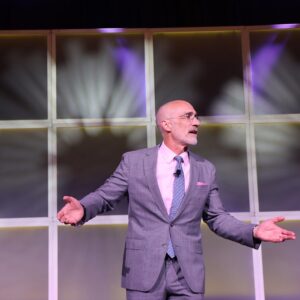Renowned happiness expert breaks down the science of joy and its real-life applications.
At the recent Destinations International 2024 Annual Convention (DIAC24) in Tampa, Florida, opening keynote speaker Arthur Brooks set the tone for an enthusiastic introspection among the attendees that would carry through the rest of the conference and beyond.
Don Welsh, CEO of DI, shared with Smart Meetings that bringing in Arthur Brooks was an immense privilege. “I was watching CBS one morning, having my coffee, and [Brooks] came on and he was being interviewed,” says Welsh. “What he talked about—within 30 seconds—resonated with me. It was maybe a five-to-10-minute interview… And then they interviewed Oprah Winfrey, and she talked about how she had seen him speak, and she said, ‘Well, it changed my life.’”
Read More: DIAC24 Recapped: Happy Communities, Strong Destinations
Introducing Arthur Brooks

Arthur Brooks is known as a “happiness expert”—a professor at the Harvard School of Business, he teaches a course on the science of happiness, how our brains process it and how people can get more of it in their lives and share it with others as a leader. It’s currently the most oversubscribed elective at the school; he currently has 180 students, and 400 more on the waiting list.
Now, that’s a high demand! Luckily for the attendees at DIAC24, Brooks came in to share some of his greatest insights with them.
Brooks is also an expert in economics and nonprofit management, the author of several books and peer-reviewed papers and has been awarded seven honorary doctorates.
Welsh says, “I hope that those of us who heard Arthur speak, and overall have been in this positive environment, take these lessons back to [our] fellow team members. It all goes back to [the idea that] people’s mental and emotional health are so desperately needed. And we take that very seriously.”
Smart Meetings had the privilege of being in that audience, and now we’re here to share those lessons with you—so you can take them in for yourself, your team and your attendees.
Defining Happiness
Brooks starts out by stating that happiness is not a feeling. “And that is really good news, because if you’re looking for a feeling, it’s a vapor…Happiness is not something you’ll be able to do anything about. It will just visit you from time to time.”
“Happiness and feelings, of course, are related, in the same way that the smell of your turkey is evidence of dinner,” he says, eliciting a laugh from the crowd. He continues, “Happy feelings are evidence of happiness. The happiness itself is more tangible.”
He extends the metaphor, explaining that we can view happiness like a meal, made up of macronutrients. In a meal, we need protein, carbohydrates and fat. Happiness, too, has its own set of “macronutrients.” To be happy, we need a balance and abundance of the different factors that contribute to the full thing.
Read More: Hey, Busy Meeting Planner, You Feeling Stressed?
The Building Blocks of Happiness
 “Happiness,” Brooks says, “is a combination of enjoyment, satisfaction and meaning.”
“Happiness,” Brooks says, “is a combination of enjoyment, satisfaction and meaning.”
He goes on to break down each of these three points. But first—a quick lesson on the brain.
There are three major functions of the human brain when it comes to emotion, Brooks explains.
The brainstem and cerebellum are in charge of detecting things below our level of consciousness: the air temperature, the level of light in a room and adjusting the body accordingly to keep it functioning; that is, if it’s too hot, you’ll start to sweat.
The limbic system translates that information and turns it into emotions. “Below your level of consciousness,” Brooks explains, “you’re sensing opportunities and threats.” Here, he takes a moment to explain that this brain function is why negative feelings are not a bad thing, and shouldn’t be believed to be. “If you never had negative emotions, you wouldn’t run away from a tiger! And your line would have died out 250,000 years ago.”
Next comes what he terms the “C-suite” of your brain: the prefrontal cortex. This is our consciousness. The prefrontal cortex receives the emotions coming from the limbic system, and is where we interpret them, then determine our response.
Enjoyment
Beneath enjoyment is pleasure, Brooks explains. “When you take pleasure, and you add two things, it becomes enjoyment: people and memory.” When it comes to the audience of destination marketing professionals at DI, Brooks says they can use this understanding to market: “The goal is not just to show the pleasurable experiences that people get with travel and tourism; it is to show the pleasure they get by making memories with people that they love.”
Satisfaction
 “Satisfaction is a funny human thing,” says Brooks, “Because it’s the joy that you get after struggle.”
“Satisfaction is a funny human thing,” says Brooks, “Because it’s the joy that you get after struggle.”
Brooks explains that we can’t stay in that satisfied state forever—eventually, we will return to our baseline, our emotional state of the day-to-day, and be ready for the next set of circumstances. This is why people are always on the hunt for good things—more, more, more. But, Brooks says, “If you want lasting satisfaction, you need to use a different model: your satisfaction is equal to all the things you have, divided by all the things you want. If you want your satisfaction to persist, you also need to want less.”
There is nothing wrong with having cravings and desires, Brooks says, but they are not an end in themselves; we just have to find the balance.
Meaning
Think of meaning as your personal mission statement.
“Many people struggle with this,” Brooks says. Through his research, he has found that “the number one reason for the explosion of anxiety and depression among adults today is a lack of sense of their life’s meaning and an inability to articulate it.” One of the key factors behind this trend is the immense amount of distraction present in our modern world, whether through social media, a lack of work/life balance, a mountain of responsibilities or something else.
Brooks offers a set of three questions through which people can pin down what brings them meaning.
- Why do things happen the way they do? Do you have a theory that you’re willing to embrace?
- What are your goals and direction? Where are you going with your life?
- Why does it matter? Why does it matter that you are alive, and why does it matter to the world that you are waking up each morning?
Where Does Happiness Come From?
It’s fairly well known these days that there is a genetic basis for happiness—but the genetic basis is not everything. Brooks breaks down the external factors that determine our day-to-day level of happiness, beyond how it functions in the brain.
Genetics has about a 50% influence. Another 25% of a person’s happiness is determined by their circumstances—having enough financial security to support their needs, like food and a home. Habits make up another 25%—and this is where we have direct control, Brooks says.
“There are four things each of us needs to do to get the maximum amount of happiness, that are under our control,” Brooks says.
-
 Brooks explains, this doesn’t necessarily mean religious faith, although it can be for some people. When it comes to faith, he says, it’s something that gives you a sense of how vast life is and makes all the tedious tasks of life—commuting, having lunch, breaking down our finances—all seem a little less overwhelming. “You need to get small,” he says. Consider the bigger picture.
Brooks explains, this doesn’t necessarily mean religious faith, although it can be for some people. When it comes to faith, he says, it’s something that gives you a sense of how vast life is and makes all the tedious tasks of life—commuting, having lunch, breaking down our finances—all seem a little less overwhelming. “You need to get small,” he says. Consider the bigger picture. - The benefit of close family connections has a neurophysiological basis: oxytocin, or the bonding hormone. “When you see family members or people you have adopted into your family, like a spouse, there’s nothing quite like it.”
- You can be surrounded by people all day long, but still be lonely, Brooks says. Why? “Real friends are useless,” Brooks says. Friendship is not about how we can benefit one another, but the bonding, joy and experiences that people share when in one another’s presence.
- When it comes to our work bringing us happiness, we tend to focus on factors like title, money or prestige—but this does not create real happiness. To create happiness in your work, focus on the value that you create, particularly in the lives of others. Serve others, and in doing so, find value within yourself.
Read More: How a Service Mindset Can Help Meeting Profs
Going back to the meal analogy, Brooks says, there must be balance between all four. “Don’t put all your eggs into one basket.”
Many people find that, by incorporating Brooks’s practice of happiness, their lives change—drastically. One key aspect is the idea that happiness is personal to us, yes, but it doesn’t end there. It’s about the people around us too.
“I want you to reflect on your life and the lives of the people that you love,” Brooks says. “Think about what you can do to bring these ideas to others, how you want to talk about these ideas when you’re at home and how you can incorporate some of these ideas into your daily work.”
Your Happiness Action Plan
Brooks closes out his keynote by offering one final set of principles to summarize the wealth of information he had offered the audience.
- Understand and change your habits, and share with others.
- Ask yourself, do you have a pleasure-seeking strategy or an enjoyment-seeking strategy?
- You don’t need to maximize. Let go of the desire to.
- Find your answer to the question, “Why am I alive?”
- Share love. “Live in love,” says Brooks, “Happiness is love. Spread more of it.”
- Get happier in your work.

“We can all get happier—if we actually understand how it works, change our habits and share it with others,” Brooks says. “Think of it in context of the work that you do…As you incorporate some of these ideas, you can be more effective and more fun; and you can be more productive and more prosperous. And that’s what I want—because the world needs more of you.”
Read More: Mental Health at Meetings: Engage Your Attendees with Wellness Activities




